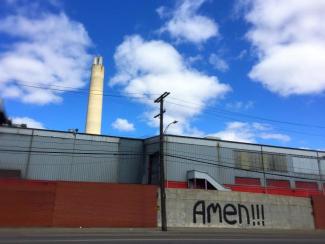The successful campaign to close the Detroit trash incinerator

While the facility was controversial from the beginning, City officials thought it would give Detroit a long-term solution for its waste management needs, saving the community money with state-of-the-art technology. The result was anything but. The City lost millions, and the community suffered from high levels of asthma-inducing air pollution. Decade after decade, Detroit activists campaigned to close the facility.
In the mid-2000s, the Ecology Center joined with environmental justice organizations and community groups to renew the fight against the Detroit incinerator and to promote zero waste in Detroit.
The Zero Waste Detroit (ZWD) coalition promoted a positive vision of a zero waste future, but fiercely organized to close the facility. The campaign led to brief closures of the incinerator, but it continued to burn the waste not just generated in Detroit, but from all of the surrounding communities. The incinerator continued to generate toxic air pollution and noxious odors for the community, violating their permit hundreds of times. In the 2010s, ZWD focused on promoting the City’s new recycling program.
In 2015, two of Zero Waste Detroit’s member organizations -- the Ecology Center and EMEAC -- organized the Breathe Free Detroit campaign to renew focus on the incinerator.
Between 2015 and 2018, the incinerator violated the terms of its air permit over 700 times, and the Breathe Free Detroit campaign organized the surrounding neighborhoods to call for the facility’s closure. Residents filed odor complaints with the Michigan Department of Environmental Quality, and staged demonstrations to demand relief.
In 2018, the coalition published a comprehensive analysis of the incinerator’s operation, and received frequent coverage in the Detroit Free Press, Detroit News, and other local media. In February 2019, the Ecology Center and Environment Michigan filed a notice of intent to sue Detroit Renewable Power (DRP), the owner of the incinerator, for its hundreds of air permit violations. Anticipating a negative judgment that would force major capital upgrades to the facility, DRP closed the incinerator a week before the lawsuit would have been filed.
The Breathe Free Detroit campaign has gone on to keep fighting for the neighborhoods around the incinerator, fighting gentrification and other issues.
The Ecology Center’s focus has turned to other air quality threats in Detroit, deploying air monitors to give residents real-time information on-air problems. We’ve also shifted our focus to other solid waste problems -- like the myriad of problems with plastic waste, and the conditions that are undermining recycling throughout the country.


